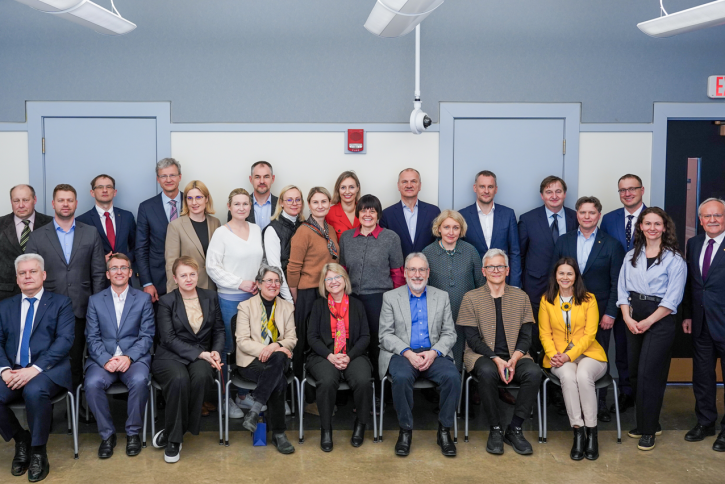
Meeting of the Lithuanian delegation with MIT President Sally Kornbluth and Vice Provost Duane Boning.
When Gediminas Urbonas discusses MISTI Lithuania, it becomes clear that this is no conventional academic exchange. It is, in his words, a “transatlantic bridge” – one built on the foundations of artistic intelligence, cultural innovation, and a profound belief in the humanities as essential agents of technological transformation. In an expansive conversation with Marissa Friedman in June 2025, Urbonas traced the program’s trajectory, its richly interdisciplinary fabric, and its bold vision for the future.
From vision to consortium
The origins of MISTI Lithuania trace back to the summer of 2022, mere months after the full-scale Russian invasion of Ukraine. It was then that Urbonas met with Professor Elizabeth Wood and MIT-Eurasia Managing Director Ekaterina Zabrovski to explore how MIT could foster transatlantic academic bridges with countries facing heightened geopolitical threats, particularly in the Baltic region. What began as a pilot exchange grew into a national consortium involving major universities and companies including Lithuanian Railways, Ignitis Group, and Novian Group. At the heart of this vision is scale. “What Lithuania can offer is a unique laboratory of manageable scale… to experiment with autonomous energy grids, climate resilience, cyber security, biotech and regional collaboration across the Baltic sea,” he explained.
Working closely with Gintaras Valinčius, the chairman of the Lithuanian Research Council, as well as with the Global Lithuanian Leaders network (GLL), the team assembled a powerful coalition of universities, public institutions, private companies and startups. Among others this included the National Gallery of Art, which hosted MIT student interns in Lithuania during the summers of 2023 and 2024.
Encouraged by the success of these pilot internships and responding to growing interest from over 40 Lithuanian organizations, Urbonas and collaborators organized a strategic series of meetings in spring 2024, bringing together business leaders, university rectors and vice-rectors, and key officials from the Ministries of the Economy and Innovation, Education, Science and Sport, and Energy. Together, they identified shared priorities in fields such as energy transition, biotechnology, cybersecurity, quantum technologies, and transportation futures.
With the guidance of Professors Elizabeth Wood and Bruce Tidor, former MIT Vice Provost for International Activities, and the dedicated coordination of Ina Žurkuvienė in Lithuania, this collaborative effort culminated in the founding of the MIT–Lithuania Consortium in fall 2024. In January 2025 an official collaboration agreement between the MIT Center for International Studies and the Consortium was signed at the Presidential Palace in Vilnius, Lithuania. The ceremony featured greetings from the President of Lithuania and the U.S. Ambassador, and included addresses by Elizabeth Wood, Urbonas himself, and Duane Boning, the new MIT Vice Provost for International Activities.
As part of the event, Professor Vladimir Bulović, Director of MIT.nano, delivered a keynote titled “The Future Will Be Measured in Nanometers,” setting the tone for a forward-looking, cross-disciplinary partnership. A panel discussion followed, bringing together leaders from academia and industry to explore new models for collaboration. “It’s important for us to have art in this equation,” said Urbonas. “We’re working to position art as a catalyst—an active agent of exchange across knowledge spheres. This is not just about STEM, but about STEAM—where we add ‘A’ for Art, Architecture, and Design to the core of scientific and technological innovation.”
The Research Council of Lithuania played a pivotal role in convening stakeholders and shaping the agenda. Today, Consortium members include a diverse array of Lithuanian universities, research institutes, and companies such as AB Ignitis Group, AB Lithuanian Railways, Novian, and Euromonitor International. All major Lithuanian stakeholders formally signed a commitment letter, solidifying the collaboration’s strategic and long-term direction.

